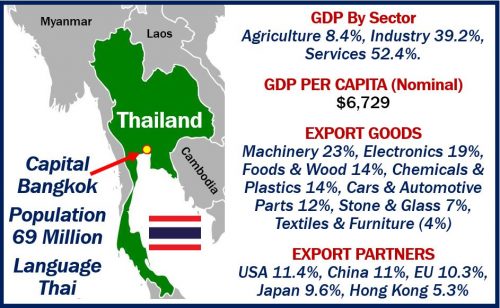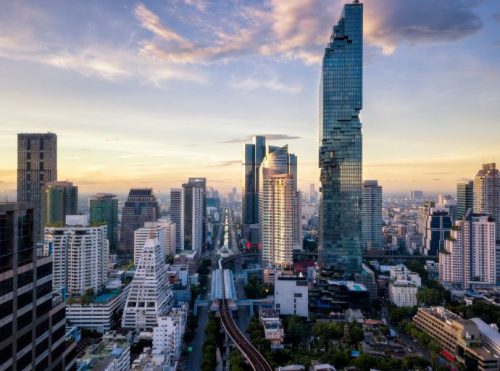Thailand has the eighth largest economy of Asia and the 26th largest in the world. It has been rapidly transforming from an agriculture-based to a service- and manufacturing-based economy. Economists describe Thailand as a newly industrialized country.
The country depends heavily on exports, which represent over two-thirds of its GDP. GDP stands for gross domestic product. Every year, it manages to have a trade surplus. In other words, its exports are worth more than its imports.
In 2017, the Thai currency, the Baht, was the tenth most commonly used world payment in the world. Today (5 December 2018), ฿32.75 equal US$1. ฿ is the symbol for the Thai Baht.
Economy of Thailand – IMF Outlook Report
The International Monetary Fund (IMF) says that the outlook for the economy of Thailand has been improving. It estimates that in 2017, GDP grew by 3.9%. GDP stands for gross domestic product. This was the fastest annual growth rate since 2013.
However, the IMF adds that the economic expansion is not yet broad-based. The Thai government needs to employ key reforms to raise domestic demand. It also needs to prepare the economy for an aging population, the IMF said in its latest annual assessment.
IMF economists expect Thailand to maintain its growth momentum in 2018 and 2019. Tourism, which has been expanding, is expected to continue growing. Economists also say the same about manufacturing goods.
However, they forecast more gradual consumption and investment growth.

Opening a company in Thailand
A team of experts specializing in company incorporation matters says that foreign investors in Thailand can benefit from non-tax and tax incentives, depending on the type of activity they want to undertake.
Research and development and advanced technology training, for example, are eligible for corporate tax exemption.
Limited liability companies in Thailand
As in other countries, the owner of a Thai limited liability company is only legally liable for its debts to the extent of the capital he or she invested in it. In other words, just the value of the shares is at risk if the company goes bankrupt, but not the shareholder’s personal money and other personal assets.
In Thailand, limited liability companies are typically formed with at least three shareholders, with one director in charge.
ThaiCompanyFormation.com has an easy-to-understand webpage that explains what the four steps are to forming a limited liability company in Thailand.

Foreign direct investment
Foreign direct investment or FDI is a major element of the economic development of Thailand. It is one of the most important FDI destinations in south-east Asia.
After a long period of decline, FDI in 2017 increased significantly, says the UNCTAD World Investment Report 2018. UNCTAD stands for the United Nations Conference on Trade and Development.
From 2016 to 2017, FDI increased threefold, reaching $7.6 billion. Much of this increase came from Japan, the European Union, and the ASEAN countries. ASEAN stands for the Association of Southeast Asian Nations.
The largest investors in Thailand by far are Singapore and Japan. The two countries account more than half of all FDI inflows. Mauritius, the UK, Germany, Switzerland, Taiwan, and the Netherlands are also major investors.
Banco Santander says that 70% of FDI inflows in Thailand consist of manufacturing, financial, and insurance activities. It adds that commerce, information, and communication are also important.

Tourism
Tourism is a key driver of GDP growth. It is also a key contributor to the country’s current account surplus of 10.6% in 2017. Over 34 million tourists visit the country each year. You can explore some of the most popular locations in the latest travel guides from Thailand Nomads.
The IMF says that the tourism boom is great news for Thailand’s economy. However, most of the gains are focused on a few tourist resorts. They have not yet benefited other sectors of the national economy.
Poverty and inequality
Poverty
The number of poor people in Thailand fell from 7.1 million in 2014 to 4.9 million in 2015. That was a decline from 10.5% to 7.2% of the population. The country defined its poverty line as anybody earning ฿2,647 ($81) per month or less.
Inequality
The Credit Suisse Global Wealth Databook 2016 ranked Thailand as the third most unequal nation in the world, after Russia and India. Fifty-eight percent of the country’s wealth belongs to just 1% of its population.

